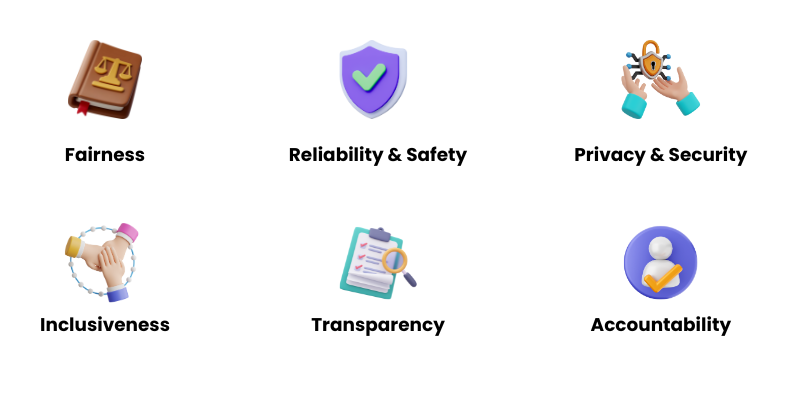What Is Responsible AI?
Artificial Intelligence (AI) represents a remarkable advancement in technology, enabling machines to mimic human-like thinking and problem-solving abilities. Unlike humans, AI systems excel at processing vast amounts of data swiftly, leveraging this information to identify patterns, make decisions, and draw conclusions within remarkably short timeframes. However, for these systems to perform optimally and produce accurate outcomes, they require extensive training with diverse datasets, encompassing a spectrum of scenarios, including edge cases.
Responsible AI emerges as a critical imperative in the development and deployment of AI solutions. It embodies an approach that prioritizes the creation, implementation, and utilization of AI solutions in a manner that upholds safety, trustworthiness, and ethical principles. At its core, responsible AI endeavours to ensure that these systems operate with human well-being and aspirations at the forefront, safeguarding against biases and unintended consequences. By adopting responsible AI practices, developers and organizations aim to foster inclusivity and fairness, ensuring that the benefits of AI are accessible to all while mitigating potential risks.
Microsoft’s Responsible AI Standards
Microsoft has established comprehensive responsible AI standards, providing a framework for building AI solutions that align with ethical principles. These standards encompass six key principles:

- Fairness: Ensuring equitable treatment for all individuals or groups without bias.
- Reliability and Safety: Ensuring AI systems operate consistently, safely, and dependably under various conditions through rigorous testing and validation.
- Privacy and Security: Maintaining transparency and control over data collection, use, and storage.
- Inclusiveness: Developing systems that are non-discriminatory, unbiased, and accessible to all.
- Transparency: Providing clarity on how AI systems operate and communicate their decisions.
- Accountability: Taking responsibility for data usage and compliance with ethical principles.
Concerns In Building AI For Different Businesses
Recognizing the diverse landscape of industries adopting AI, it’s crucial to acknowledge and address the specific challenges each sector faces in implementing responsible AI practices. Let’s delve into the industry-specific concerns in healthcare, finance, auditing, insurance and legal, highlighting the importance of tailored approaches to ensure ethical and effective AI deployment.
Healthcare
In the healthcare sector, data privacy and security are paramount concerns. AI systems must be designed to ensure the confidentiality and security of sensitive patient information, complying with regulations like HIPAA to protect health information. Additionally, these systems should provide interpretable outputs to healthcare professionals, offering clear explanations for AI-driven diagnoses and treatment recommendations. Transparent communication about AI involvement in patient care and obtaining informed consent from patients regarding AI-driven interventions are essential practices. Moreover, mitigating bias in AI algorithms is crucial to avoid disparities in healthcare outcomes and ensure equitable access to healthcare services for diverse demographic groups.
Finance
The finance industry faces challenges in assessing and managing risks associated with AI-driven financial decision-making. AI models must adhere to regulatory requirements and industry standards to maintain integrity and trust. Robust AI algorithms are necessary for detecting and preventing financial fraud, striking a balance between accurate fraud detection and minimizing false positives. Transparency in credit scoring models is essential for regulatory compliance and fairness in lending practices, avoiding discriminatory outcomes. Adhering to financial regulations and compliance standards like Sarbanes-Oxley in AI applications is imperative. Regular updates to AI systems ensure alignment with changing financial regulations, mitigating compliance risks.
Auditing
In auditing, ensuring the accuracy and reliability of AI systems is critical. Rigorous validation processes verify the correctness of audit outcomes, maintaining data integrity and consistency across different business entities. Adherence to auditing standards and regulations like Generally Accepted Auditing Standards is essential to uphold integrity and trust in audit results. Addressing ethical concerns related to the use of AI in auditing, such as maintaining independence and objectivity, is paramount.
Insurance
The insurance industry requires AI systems that can accurately assess risk and determine premiums without bias. Ensuring fairness in these calculations is critical to avoid discriminatory practices. AI must also comply with regulatory standards such as those outlined by the National Association of Insurance Commissioners (NAIC). Transparency in decision-making processes helps build trust with policyholders, making it clear how decisions about coverage and claims are made. Additionally, robust data security measures are necessary to protect sensitive customer information and prevent data breaches.
Legal
In the legal sector, AI tools used for tasks such as legal research, contract analysis, and case prediction must be reliable and unbiased. Ensuring that AI systems provide accurate and relevant information is crucial for maintaining the integrity of legal processes. Compliance with legal ethics and standards, such as those set by the American Bar Association (ABA), is essential. AI must also enhance, rather than undermine, the accessibility and fairness of legal services. Transparency in AI-driven legal decisions and processes is vital for maintaining trust in the legal system.
By addressing these concerns, businesses can harness the transformative potential of AI while upholding ethical principles and regulatory compliance in their respective industries.
Conclusion
Embracing Responsible AI For A Sustainable Future
In conclusion, responsible AI stands as a beacon guiding the development and deployment of Artificial Intelligence solutions. It encapsulates a commitment to safety, trustworthiness, and ethical conduct, ensuring that AI systems operate with human well-being at the forefront. Microsoft’s Responsible AI Standards provide a robust framework, encompassing principles such as fairness, reliability, privacy, inclusiveness, transparency, and accountability.
As industries embrace AI technologies, it’s essential to acknowledge and address the specific challenges each sector faces in implementing responsible AI practices. In healthcare, the focus is on safeguarding patient privacy and ensuring equitable access to healthcare services. The finance industry grapples with managing risks and ensuring regulatory compliance, while auditing demands accuracy, reliability, and adherence to standards. The insurance sector requires fair and unbiased risk assessments and robust data security, while the legal industry focuses on maintaining the integrity and fairness of legal processes through reliable and transparent AI tools.
By addressing these concerns and adopting tailored approaches, businesses can harness the transformative potential of AI while upholding ethical principles and regulatory compliance. Together, we can navigate the complex landscape of AI innovation, fostering collaboration and pushing the boundaries of responsible AI implementation.
In embracing responsible AI, we pave the way for a future where technology serves humanity equitably, leaving no one behind. Let us continue to champion responsible AI practices, ensuring that the benefits of AI are accessible to all while mitigating potential risks and maximizing societal benefits.
 By
By